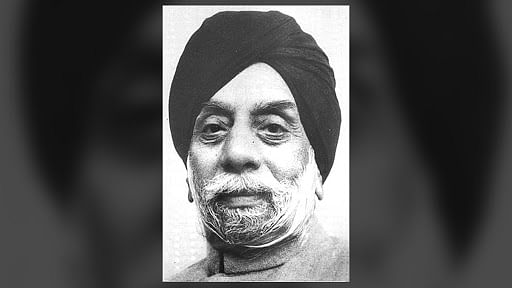Sardar Hukam Singh, who served in first three Lok Sabhas, refused to sign draft of the constitution as he felt it failed to secure Sikh community’s identity & rights.
A devout Sikh, lawyer and later Lok Sabha speaker, Sardar Hukam Singh was one of the most dynamic members of the Constituent Assembly of India.
Known for his strong commitment to the cause of the minority rights, Singh had even refused to sign a draft of the constitution as he felt it failed to secure the Sikh community’s cultural identity and rights.
Early activism
Born on 30 August 1895, Singh hailed from Montgomery in Sahiwal district, which now lies in Pakistan.
Also read: Hiralal Shastri, the man who pushed for equal rights within Constituent Assembly
After matriculation from a government school, Singh graduated from Amritsar’s Khalsa College in 1917. Four years later, he cleared his LLB examination from Lahore’s Law College and set up practice in Montgomery.
In 1923, he took part in the anti-Simon Commission demonstrations and was arrested during a police charge on a procession in the streets of Montgomery.
As part of the Shiromani Gurdwara Prabandhak Committee, Singh was involved in the movement to free Sikh Gurdwaras from the political influence of the British. Along with several other members of the Committee, he was arrested in 1924 and imprisoned for two years.
Later, after news of Partition broke, Montgomery, a Muslim-majority town, witnessed riots between Muslims and Hindus and Sikhs of the region. Disregarding his own safety, Singh actively took part in evacuating people from their houses and moving them to a safe place.
Constituent Assembly debates
Singh was elected to the Constituent Assembly in April 1948 as a member of the Shiromani Akali Dal.
A few months after being elected, he raised a motion to amend the articles of the Constitution which refer to schedule castes, to substitute the words ‘Schedule Castes’ with the words ‘Backward communities of whatever class or religion’.
Securing rights for the underprivileged in the Sikh community as well as in the Muslim, Parsee (Parsi) and Anglo-Indian community was of utmost importance to him. He was against the Constitution subsuming Sikh SCs as part of Hindu SCs and not giving the community a separate religious status which would provide them greater security.
Along with another Sikh representative, Bhupinder Singh Mann, Singh refused to sign the constitution draft over a sense of injustice.
He said, “Let it not be misunderstood that the Sikh community has agreed to this Constitution. I wish to record an emphatic protest here…The minorities and the Sikhs have been ignored and completely neglected.”
But Singh was against reservation of seats in Parliament for minorities. He believed that just like separate electorates, reserving seats in the Parliament was also a communal approach.
Rather than safeguarding the interests of the minorities, he said, they further benefit the majority.
“When you are reserving, say 30 per cent, for the minorities, indirectly you are reserving 70 per cent for the majority,” he said.
“When the minorities see that certain members of their community, offensive to them, are being pushed up and backed by the majority community, certainly the relations would get strained and our object would not be fulfilled at all. And secondly, under this reservation of seats, the majority would be able to secure some Members from the minorities of their own choice, while there will be a certain proportion that would be returned by the minorities themselves,” said Singh.
He feared that such reservations would, thus, serve to create rifts in the minority community.
His views on nationalism and majoritarianism were also telling.
“The majority community should not boast of their national outlook. It is a privileged position. They should try to place themselves in the position of the minorities and try to appreciate their fears. All demands for safeguards and even the amendments that have been tabled here are the products of those fears that the minorities have in their minds,” he said.
Political career and later life
After his active participation in the Constituent Assembly’s debates, Singh was unanimously elected as the Lok Sabha Deputy Speaker in 1956, despite being a member of the opposition, a testament to his credibility.
Singh even launched English weekly Spokesman in Delhi in 1951 and served as its editor for a few years.
Later in his political career, Singh joined Congress and remained a member.
Also read: Gokulbhai Bhatt, the Constituent Assembly member who called the Constitution ‘un-Indian’
After serving in the first 3 Lok Sabhas, first as the Deputy Speaker and then as the Speaker, Singh was appointed the Governor of Rajasthan in 1967.
In March 1973, the Shiromani Gurudwara Prabandhak Committee formed the Sri Guru Singh Sabha Shatabdi Committee to celebrate 100 years of the Singh Sabha movement launched in 1873. Singh was appointed as the president of the committee.
Singh died on 27 May 1983.



